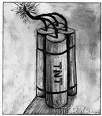 Often in nature there seem to be a connection between learning and evolution. Some traits that are inherited today seem to first have been passed from parent to child by learning. First it was thought that genes actually could change as the result of learning, this is called Lamarckism, today we know this is not the case. The genes are the same through the life of an organism.
Often in nature there seem to be a connection between learning and evolution. Some traits that are inherited today seem to first have been passed from parent to child by learning. First it was thought that genes actually could change as the result of learning, this is called Lamarckism, today we know this is not the case. The genes are the same through the life of an organism.So how does it happen that learnt traits can enter the genome. It is really not that strange. If a behaviour starts to spread among a group of individuals and parents teach this behaviour to their children those children more adept at that behaviour will have a slight advantage. This is called the Baldwin effect.
This is interesting because when designing an evolutionary algorithm this should be accounted for. Introducing learning and teaching could have beneficial effects on the fitness landscape. The fitness of an organism should not be calculated on the genes but on the phenotype. Allowing the phenotype to change, by learning or by physically adapting, during it's life allows the genes to express their potential. The genes can be more general in their expression, you don't need a gene that says 'this creature climb trees' but instead say 'this creature is agile', 'this creature is strong' and 'this creature has claws'. The tree climbing part is part of the behaviour that is passed by learning and the physical traits increases the ability to fulfill that behaviour.
Introducing a phenotype gives other benefits. You want the genes to behave well during crossover but at the same time you want a fitness to be calculated from the genes in an easy way. Crossover works best when genes that cooperate is close in the genome. They want to get passed as a bundle. So allowing genes to be able to move within the genome, called transposition and occurs in real cells during recombination, allows genes that cooperate to move together and so increasing the chance that they will get passed together. And when you allow genes to move around it is often beneficial to introduce the concept of a phenotype that is easier to use for matching the organisms against each other.









